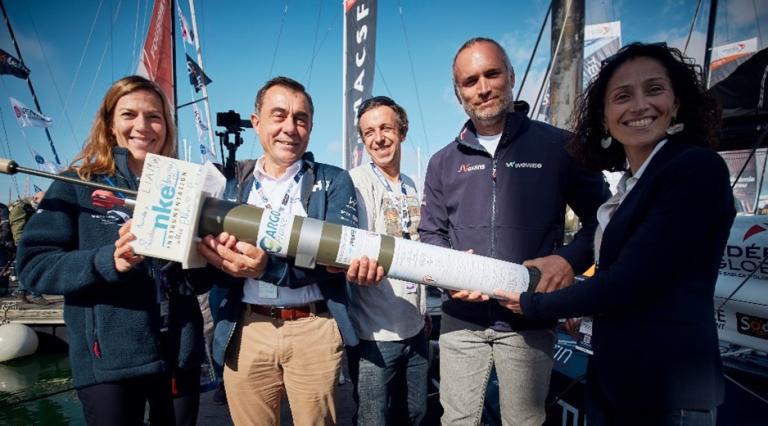Twenty-five skippers will support ocean science and observations during the Vendée Globe 2024, the largest solo non-stop round-the-world yacht race. These dedicated sailors are committed to advancing oceanographic research and weather forecasting by carrying and deploying scientific instruments provided by the World Meteorological Organization (WMO), the UN Educational, Scientific and Cultural Organization (UNESCO), and their scientific partners onboard their IMOCA yachts.
This collaboration between scientists and sailors will facilitate the real-time collection and distribution of essential data to users worldwide, including ocean temperature, atmospheric pressure, and dissolved carbon dioxide concentration in remote, under-sampled areas. This will help improve understanding and managing climate change, improving weather forecasts and supporting early warning systems, and assessing ocean and marine ecosystems health.
The skippers will use a range of scientific equipment, including drifting surface buoys, weather stations, autonomous profiling floats, mini oceanographic labs, and more, all designed to collect crucial met-ocean data. The instruments, supplied by major scientific institutes and agencies such as Météo-France, the UK Met Office, Ifremer, CNES, GEOMAR, the TARA Foundation, and ETH Zürich, feature cutting-edge technology.
The data collected during and after the race will contribute to the Global Ocean Observing System (GOOS), supported and coordinated by OceanOPS , the joint center of excellence established by WMO and UNESCO.
The Vendée Globe race starts on 10 November from Les Sables d'Olonne.
In preparation, 25 sailors received special training and scientific equipment at a two-day workshop on 22 and 23 October at the start venue.

"The partnership with the Vendée Globe and the IMOCA Class builds on over a decade of collaboration with offshore sailors. It's a win-win situation, as sailors benefit directly from their contributions to science. By deploying weather buoys and collecting atmospheric pressure measurements, they enhance their own weather and ocean forecasts, which they can download during the race," says Emanuela Rusciano, Science and Communication Coordinator at OceanOPS/UNESCO, who engaged with the skippers.
"As UNESCO states: we cannot protect what we do not know," and knowledge of the ocean begins with observation and data collection," she says.
This collaboration between skippers and OceanOPS is part of the Odyssey project, launched in 2021 to support the UN Decade of Ocean Science for Sustainable Development 2021-2030 . This initiative aims to structure and recognize contributions to ocean observation from civil society, the private sector, and sailors, including those in offshore races.
To ensure the effectiveness of the GOOS, it is essential to gather a maximum number of high-quality marine weather observations annually across all ocean regions. This includes deploying approximately 2,000 autonomous buoys at sea, similar to those that Vendée Globe skippers will deploy. Collaborations with these skippers are invaluable, as they enable data collection in difficult-to-access and under-sampled regions, such as the Southern Hemisphere, where the lack of observations presents significant challenges.
These initiatives also aim to raise public awareness and engage future generations in understanding the importance of ocean observation for preservation. Several educational programs, led by Ifremer and CNES, will accompany these scientific projects, integrating oceanographic sciences into classrooms while linking them to the Vendée Globe's sporting adventure.
"As the race approaches, we are thrilled to see that over half of the fleet has committed to supporting ocean sciences," comments Mathieu Belbéoch, OceanOPS/WMO Manager. "The contributions from skippers will significantly enhance our early warning systems, ensuring communities are better prepared for extreme weather events."
The scientific and technical coordination provided by WMO and UNESCO, through OceanOPS, is crucial for ensuring collaboration among partners, maintaining coherence among initiatives, and ensuring that data is transmitted according to international standards and made freely accessible to the global community.
"Our ambition does not stop here," says Belbéoch. "By 2028, we hope that all race boats will participate in this effort to support ocean sciences."
Thanks to these collaborations, ocean race skippers are no longer solitary competitors at sea but also ambassadors for science, contributing to the understanding and preservation of our ocean.






